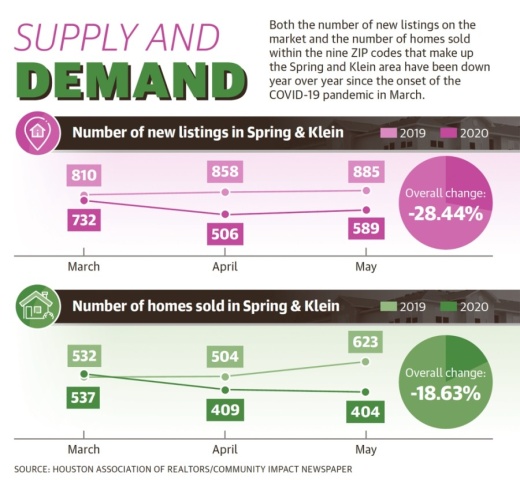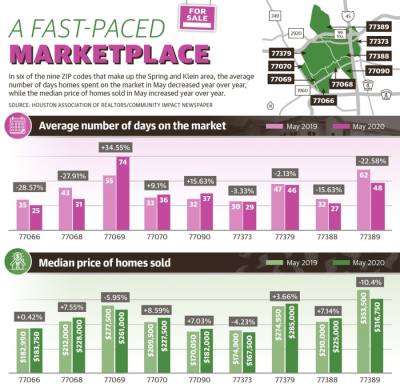As he and his wife, Ana, had been planning to relocate their family since 2019, Frank Pereira, a former Colony Creek Village homeowner, said when his family put their home on the market at the onset of the pandemic, it was too late to pause the process.
“We were worried about [the pandemic], but we were already too far into [the moving process], so we decided to go ahead and move forward with it,” Pereira said.
However, within just five days on the market, Pereira said the house had already sold: a trend local real estate agents said sellers across the Spring and Klein area are experiencing as a result of low housing inventory.
“I think everyone is a little hesitant; if they don’t have to sell, they’re not selling,” said Jerry Santiago, a certified home marketing specialist with The Santiago Team of Better Homes and Gardens Real Estate Gary Greene. “Inventory is way down, but buyer demand, ... there’s more traffic out there [now] than there was this time last year. ... So we’re seeing a very good seller’s market right now.”
According to data provided by the Houston Association of Realtors, both the number of new listings on the market and the number of homes sold within the Spring and Klein area were down 28.44% and 18.63%, respectively, year over year since the pandemic’s onset in March.
As the real estate market continues to adapt during the pandemic, local real estate agents said they are taking extra safety precautions and using technology to keep the market moving.
Adapting to COVID-19
As with most industries, the world of real estate is also getting creative to curb the spread of COVID-19 while keeping business afloat.
Vicki Fullerton, a Realtor with RE/MAX The Woodlands & Spring who serves as a director of the National Association of Realtors, said in her 42-year career in the real estate industry, nothing compares to the current state of the world.
“I’ve lived through the downturn in the ’80s, ... the floods in the ’90s, the Y2K scare, the economic downturn, the hurricanes ... and nothing has matched what we have undergone since March 10,” Fullerton said.
Across the industry, Fullerton said masks, gloves, shoe covers and hand sanitizer have become necessities for in-person showings. Additionally, doors and cabinets are left ajar while lights remain on to minimize contact.
“Not only did [the pandemic] slow the market down, but it changed everything,” said Marc Wade, a real estate agent with Red Door Realty & Associates. “It went from [being] a real personal experience ... to not being allowed to have open houses, ... sanitizing everything, ... doing virtual showings.”
When in-person showings are not a favorable option, real estate agents said they are turning to technology for the safety and convenience.
“I’ve done [virtual options] in the past for clients moving in from out of state, but I’ve offered it up even more so now ... for people who are not comfortable going out and about,” said Melissa Whitehead, a real estate agent with Red Door Realty & Associates.
Whitehead added the increase in virtual showings has become a more efficient way for buyers to narrow down the few houses they are strongly considering and would like to view in person, which cuts down on unnecessary foot traffic.
In addition to changes to the actual homebuying and selling process, real estate agents said COVID-19 has also affected the reasons why homeowners are buying or selling.
For instance, Connie Santiago, Jerry’s wife and the other half of The Santiago Team, said she had a listing recently where the homeowners were moving to be closer to family they could not see during lockdown.
Jerry Santiago added while job losses have also played a role in clients’ relocations, those who are in industries that have performed well throughout the pandemic are buying second homes.
“I know Houston is very oil and gas heavy, but there are all sorts of other industries and markets that are really doing well throughout all this, so people are still buying and selling homes at the end of the day,” Jerry Santiago said.
Real estate agents said additional effects of COVID-19 include homebuyers seeking houses with designated game rooms and office space to better accommodate children and parents in case of future lockdowns. Fullerton added homebuilders are seeing a renewed interest in new homes as homebuyers seek to limit COVID-19 exposure.
A seller’s market
As many homeowners are feeling less confident about putting their homes on the market due to the risk of exposure to COVID-19 or buying a new home due to financial uncertainty, local real estate agents said the few homes that are on the market are selling fast and for top dollar.
In six of the nine ZIP codes that make up the Spring and Klein area, the average number of days homes spent on the market in May decreased year over year, while the median price of homes sold in May increased year over year.
Whitehead said several of her homes priced $200,000 and under are receiving multiple offers well over the listing price.
The same could be said for the higher-end homes in Spring, which Connie Santiago said had previously been sitting on the market dormant.
“The $700,000s and up are flying off the shelves more than they have probably in the past four years,” she said. “And [a lot of that is] due to interest rates—that’s a huge motivator right now.”
According to Freddie Mac, also known as the Federal Home Loan Mortgage Corp., the U.S. weekly average interest rate June 25 of 3.13% for a 30-year mortgage is the lowest mortgage rates have been since Freddie Mac began tracking the data in 1971.
Connie Santiago added while new listings typically go under contract within 60-90 days, those homes are now under contract within one month.
Further enhancing the seller’s market, Whitehead said those who are daring to peruse the real estate market during current conditions are serious buyers, as opposed to what she called “lookie-loos.”
While the state’s economy came to halt in April, Wade said as the economy has reopened in recent months, so have the floodgates in terms of people ready to buy and sell homes.
“A lot of people were refraining from committing to purchasing a home or selling a home because they didn’t know what the future held,” he said. “Now, even though coronavirus has not gone away, ... the housing market has adjusted, and things are back to normal—if not even busier than normal.”





